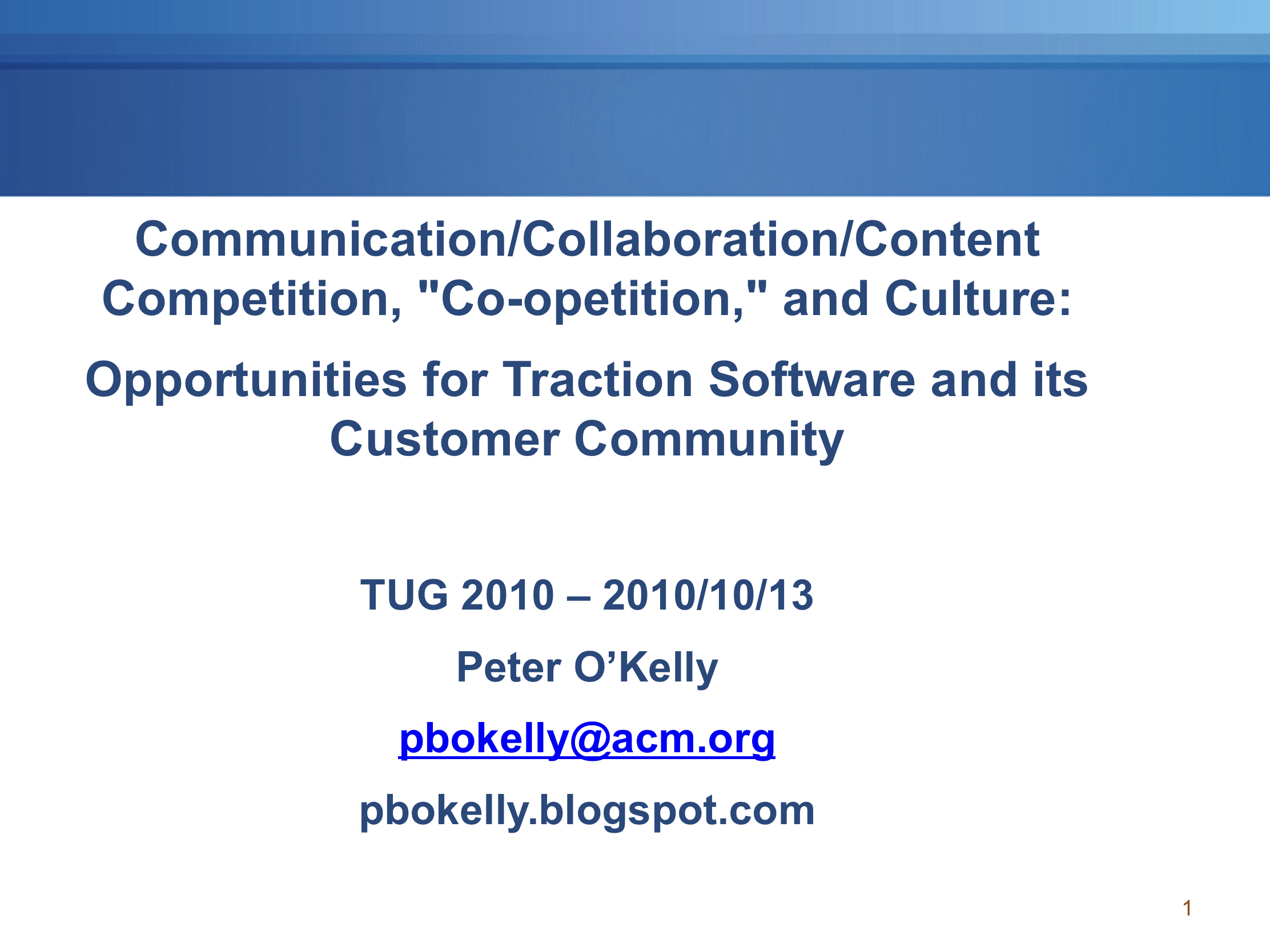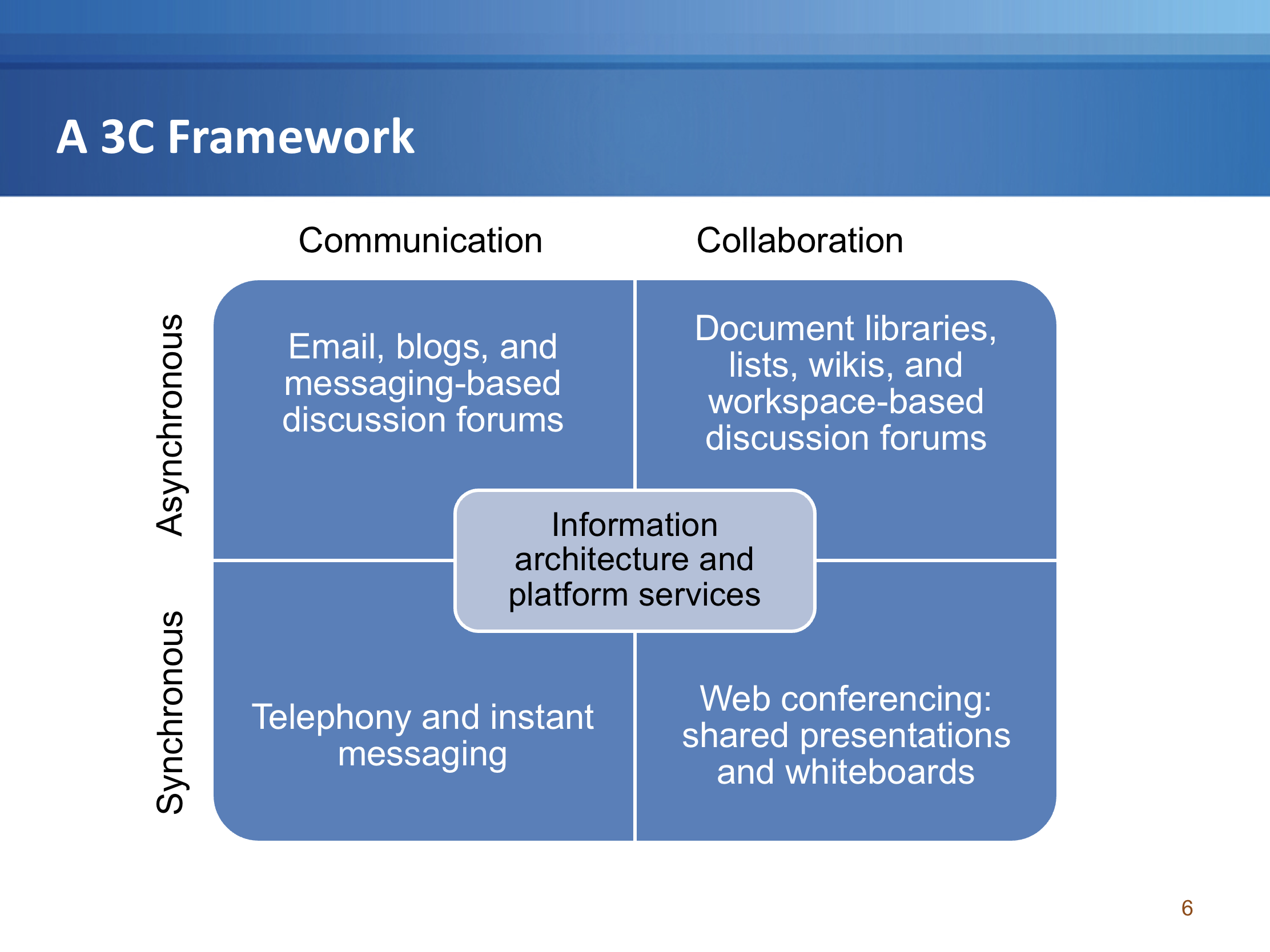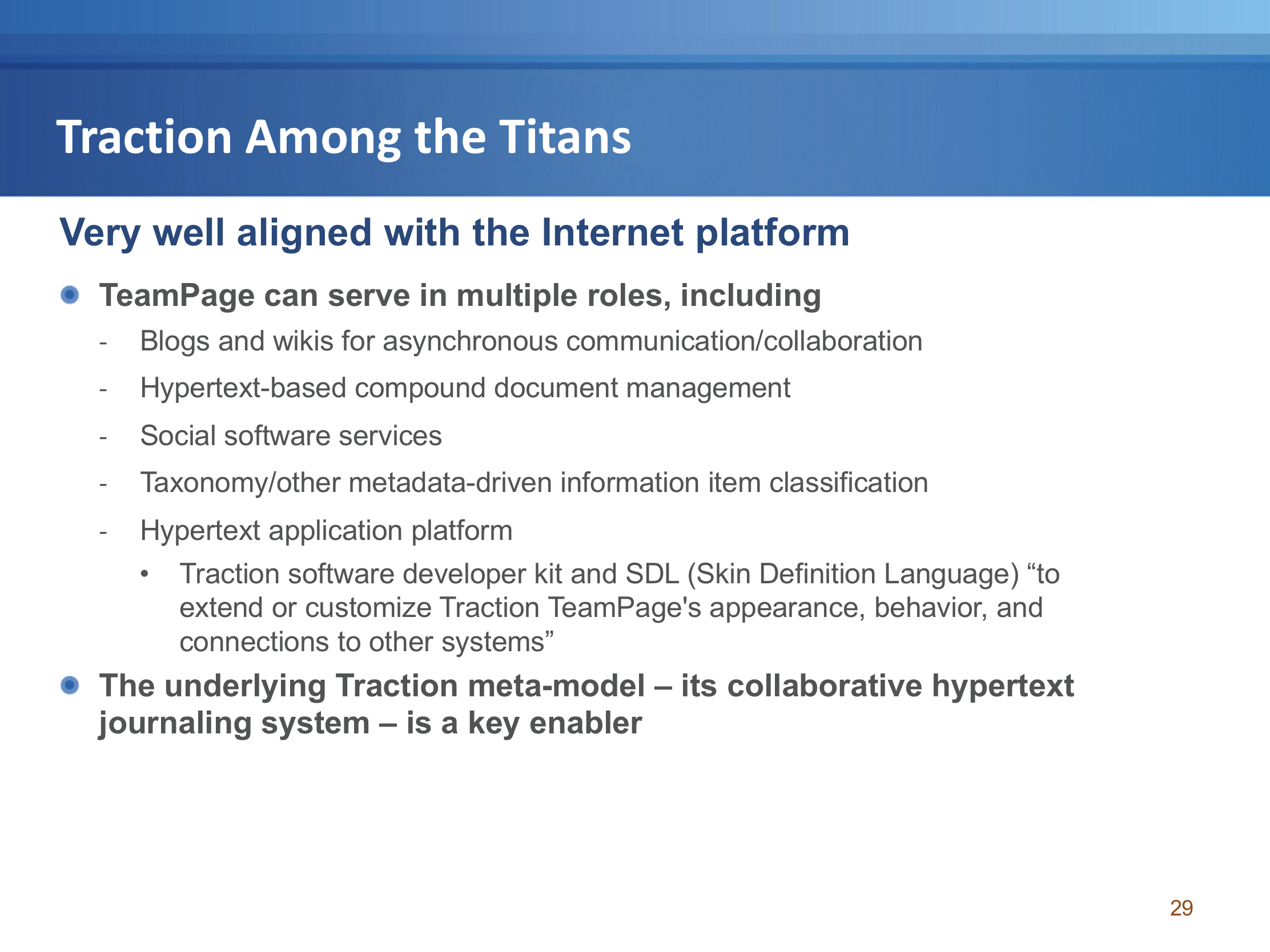Clash of the Titans - Peter O'Kelly at TUG 2010
 I'm happy to present a transcript and quotes from Peter O'Kelly's TUG 2010 talk Communication / Collaboration / Content Competition, "Co-opetition," and Culture: Opportunities for Traction Software and its Customer Community. Or, as I'll call it here Clash of the Titans. Peter draws on his career as Lotus Notes product manager at Lotus Development Corporation and IBM, IBM Director of Business Development, Groove Networks product manager, MacroMedia vice president of strategy, Microsoft Solutions Architect, and senior analyst or director with the Patricia Seybold Group, the Burton Group, and O'Kelly Associates - see Peter's LinkedIn page and personal blog. I asked Peter to write a 'Where are they now' follow up post, and he cheerfully agreed! Look for it here next week.
I'm happy to present a transcript and quotes from Peter O'Kelly's TUG 2010 talk Communication / Collaboration / Content Competition, "Co-opetition," and Culture: Opportunities for Traction Software and its Customer Community. Or, as I'll call it here Clash of the Titans. Peter draws on his career as Lotus Notes product manager at Lotus Development Corporation and IBM, IBM Director of Business Development, Groove Networks product manager, MacroMedia vice president of strategy, Microsoft Solutions Architect, and senior analyst or director with the Patricia Seybold Group, the Burton Group, and O'Kelly Associates - see Peter's LinkedIn page and personal blog. I asked Peter to write a 'Where are they now' follow up post, and he cheerfully agreed! Look for it here next week.
Peter's TUG 2010 talk was based on both his experience and his lively interest in hypertext and compound/interactive document models. In 2006, Peter wrote:
"Hypertext is simply a better form-follows function fit (than print-centric approaches) for the way people actually think and work. Compound documents facilitate focusing more on information work than on disparate technologies and tools, and foster more effective content management. Interactive document models are used to automatically and unobtrusively offer supplemental resources and actions in context, providing opportunities to more effectively leverage tools and metadata without disruptive context shifts."
In his TUG 2010 talk, Peter outlines a 25 year view on what he calls a 3C framework: Communication, Collaboration, and Content.
Using this 3C framework, Peter analyzes the history and culture of competing titans: Lotus / IBM, Microsoft, Google, Oracle, and Cisco - and where Traction TeamPage fits.
Peter O'Kelly 1:54 I'm going to talk about the Battle of the Titans that's going on right now because there's a very intense platform versus focused or best of breed, player kind of battle going on right now. Then I'll talk about where I see Traction fitting in and talk about a few cultural considerations. It's interesting for me, especially having been involved with Notes going back to the late 1980s. It's interesting to hear, these are perennial challenges, the sorts of things we've been discussing this morning.
Peter O'Kelly 2:22 So I'll try and share some good news. And again, bad news on that. And then discussion, my guess is we're going to run a little bit short on time because we're going to be hungry. So for discussion, I'm going to be around through lunch through the clambake tonight and also be around tomorrow afternoon because things they want to go into more detail on.
Peter O'Kelly 2:38 So: a very brief history of 3C. See the crux of this slide is this stuff's not new. People have been doing this for a long time. It's sort of good once in a while to stand back and say, really, why are we doing this, what we're doing this in order to get things done, we can get very creative about definitions of words like communication, collaboration and content, but ultimately the measure of this has to be 'Is it useful for getting work done?' Does it help people work together more effectively, as we've discussed this morning. From my view content, it's interesting if you do look up things in the dictionary once in a while I consider it procrasti-research to go out and check them...
Peter O'Kelly 3:52 It's a lot easier these days because people understand as you mentioned, you should do this you may be on your way to Guantanamo or you might just be unemployed. You know, you don't want to be the one who has problems with information, governments regulatory compliance. And again, everybody is just incredibly burdened for effective time and attention management, both at work and in things we do outside of work as well. So with that, one of the things are just again on a brief history on this tip of the hat to Vannevar Bush - some people say Vannevar Bush - as well. I'm sure many of you have been in the Traction community for a long time understand 65 years ago, in July 1945 there was this seminal article in The Atlantic Monthly ‘As We May Think’ there's a link behind this you can go look at as well if you want to check it out. I'm pretty sure he was from another planet because he was so prescient on what he was able to deliver he in turn influenced Doug Engelbart and it just kind of went from there with Andy van Dam, Alan Kay a bunch of others.
Peter O'Kelly 4:51 It's we've been doing this for a while. Another one that's kind of interesting is with Plato, which doesn't get a lot of air play in this. The Plato group had it 50th anniversary as well, and Ray Ozzie's down there. So Plato begat Plato Notes, VAX Notes, Lotus Notes other things, again, you see a very long term history of this. And it was interesting, then a couple of points this morning, the idea of conceptual models or using models of working with these things have has come up. And I think the products that have lasted the longest, the ones that have been most influential are ones that had a really clear sense of what they were trying to accomplish. And I'll come back to that later on in a comment about Traction.
Peter O'Kelly 5:32 One of the things that's kind of challenging about this space is marketing people tend to get very creative. So for some vendors, everything is about communication. Collaboration is a subset of communication, Eg Cisco thinks everything's about communication. For others, communication is a subset of collaboration, very squishy, and you're using common names and synonyms and not being clear on it. So one of the things I found is useful is to start with just a vendor and product independent framework that says, what are we talking about and how these pieces fit together.
Peter O'Kelly 6:00 Very briefly communication is just about the transmission of information from point A to point B. That's it usually comes in different communication channels, items and channels. Collaboration is joint purposeful work. It usually happens in workspaces with shared artifacts. Everybody gets it that communication is that is asynchronous communication. emails, the biggest one there I'd argue are blogs, and some NNTP or Usenet style discussion forums are also communication channels. Most people understand real time or synchronous communication is dominated by telephony and instant messaging, web conferencing for synchronous collaboration, most people understand that probably at least participated in web conferences and things like Live Meeting, and WebEx.
Peter O'Kelly 6:44 But this last one, which is central to what we're talking about today, is the asynchronous collaboration. That's sort of the wild frontier for a lot of people still so you've got document libraries, lists, wikis, workspace based discussion forums, I think that's the one that's least mature in the market right now.
Peter O'Kelly 7:00 It also turns out to be one that has an incredible return on investment if you play it well. So I'm just putting this framework up here, because I'm going to come back in a couple minutes and talk about IBM, Microsoft, Oracle, Cisco, Google, and we are going to eat lunch at about 12:30!
What about Traction TeamPage?
See the live live Otter.ai transcript, video and slides from Peter's TUG 2010 talk below for an insider's story of a competitive market in flux. At that time IBM alone had a long list of competing models and product families - Notes Domino? Quick Place? Quicker on Domino? Quicker on WebSphere? SameTime? which SameTime? Workplace? OutBlaze? Lotus Slide iNotes? Web Dialogs? "So if you're an administrator, an end user, an architect working on applications, you have a lot of opportunity to learn different things, I guess."
Other titans were similarly riding off madly in all directions. Do you remember Google Buzz? Google Wave? Oracle Beehive? Microsoft Lync? Cisco Quad? Peter does! Look for Peter’s ‘Where are they now?’ follow up which he’ll post here next week.
Peter O'Kelly TUG 2010 transcript
Peter O'Kelly TUG 2010 video
See also
Related
- 12-15 Oct 2010 | Fifth Annual Traction User Group Meeting, TUG 2010 Newport - On Observable Work
- October 2006 | Burton Group Report - Hypertext and Compound/Interactive Document Models
- More Observable Work - Transcribing Jim McGee's TUG 2010 Keynote - Transcript, video, slides, and related posts
- Enterprise 2.0 and Observable Work - "Invisibility is an accidental and little-recognized characteristic of digital knowledge work"
- Original Traction Product Proposal - TeamPage: A hypertext journal. Product proposal and references
- Traction Roots - Doug Engelbart - "...three primary knowledge domains: intelligence, dialog records, and knowledge product"


 I18N ERROR: @tsiskin#footer_RSS_Feed
I18N ERROR: @tsiskin#footer_RSS_Feed